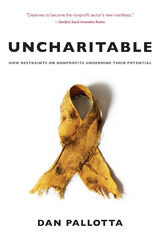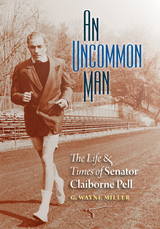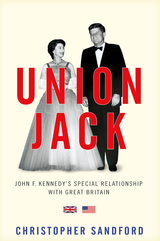247 scholarly books by University Press of New England and 3
start with U
247 scholarly books by University Press of New England and 3
247 scholarly books by University Press of New England
3 start with U start with U
3 start with U start with U

Uncharitable
How Restraints on Nonprofits Undermine Their Potential
Dan Pallotta
University Press of New England, 2010
Uncharitable goes where no other book on the nonprofit sector has dared to tread. Where other texts suggest ways to optimize performance inside the existing paradigm, Uncharitable suggests that the paradigm itself is the problem and calls into question our fundamental canons about charity. Author Dan Pallotta argues that society’s nonprofit ethic acts as a strict regulatory mechanism on the natural economic law. It creates an economic apartheid that denies the nonprofit sector critical tools and permissions that the for-profit sector is allowed to use without restraint (e.g., no risk-reward incentives, no profit, counterproductive limits on compensation, and moral objections to the use of donated dollars for anything other than program expenditures). These double-standards place the nonprofit sector at extreme disadvantage to the for profit sector on every level. While the for profit sector is permitted to use all the tools of capitalism to advance the sale of consumer goods, the nonprofit sector is prohibited from using any of them to fight hunger or disease. Capitalism is blamed for creating the inequities in our society, but charity is prohibited from using the tools of capitalism to rectify them. Ironically, this is all done in the name of charity, but it is a charity whose principal benefit flows to the for-profit sector and one that denies the nonprofit sector the tools and incentives that have built virtually everything of value in society. The very ethic we have cherished as the hallmark of our compassion is in fact what undermines it. This irrational system, Pallotta explains, has its roots in 400-year-old Puritan ethics that banished self-interest from the realm of charity. The ideology is policed today by watchdog agencies and the use of “efficiency” measures, which Pallotta argues are flawed, unjust, and should be abandoned. By declaring our independence from these obsolete ideas, Pallotta theorizes, we can dramatically accelerate progress on the most urgent social issues of our time. Pallotta has written an important, provocative, timely, and accessible book—a manifesto about equal economic rights for charity. Its greatest contribution may be to awaken society to the fact that they were so unequal in the first place.
[more]

An Uncommon Man
The Life and Times of Senator Claiborne Pell
G. Wayne Miller
University Press of New England, 2011
Claiborne Pell (1918–2009) was Rhode Island’s longest serving U.S. senator, with six consecutive terms from 1961 to 1997. A liberal Democrat, Pell is best known as the sponsor of the Pell Grants. He was also the force behind the creation of the National Endowment for the Arts and the National Endowment for the Humanities, and a visionary in high-speed rail transportation and other areas. An early environmentalist and opponent of the Vietnam War, Pell left his mark on several treaties and peace initiatives. Born into the wealthy family that settled the Bronx, New York, Pell married Nuala O’Donnell, an heiress to the A&P fortune. He lived on the waterfront in exclusive Newport, Rhode Island, yet was a favorite of blue-collar voters. Frugal and quirky, he believed in ESP and UFOs, and was often seen jogging in a sports coat and shorts. Both his hard work and his personality left an indelible mark on this small but influential state—and on America. This lively biography was written with the cooperation of the senator’s family, and with exclusive access to family records and the extensive archives at the University of Rhode Island.
[more]

Union Jack
JFK's Special Relationship with Great Britain
Christopher Sandford
University Press of New England, 2017
John F. Kennedy carried on a lifelong love affair with England and the English. From his speaking style to his tastes in art, architecture, theater, music, and clothes, his personality reflected his deep affinity for a certain kind of idealized Englishness. In Union Jack, noted biographer Christopher Sandford tracks Kennedy’s exploits in Great Britain between 1935 and 1963, and looks in-depth at the unique way Britain shaped JFK throughout his adult life and how JFK charmed British society. This mutual affinity took place against a backdrop of some of the twentieth century’s most profound events: The Great Depression, Britain’s appeasement of Hitler, the Second World War, the reconstruction of Western Europe, the development and rapid proliferation of weapons of mass destruction, and the ideological schism between East and West. Based on extensive archival work as well as firsthand accounts from former British acquaintances, including old girlfriends, Union Jack charts two paths in the life of JFK. The first is his deliberate, long-term struggle to escape the shadow of his father, Joseph Kennedy, former U.S. Ambassador to Great Britain. The second is the emergence of a peculiarly American personality whose consistently pro-British, rallying rhetoric was rivaled only by Winston Churchill. By explaining JFK’s special relationship with Great Britain, Union Jack offers a unique and enduring portrait of another side of this historic figure in the centennial year of his birth.
[more]
READERS
Browse our collection.
PUBLISHERS
See BiblioVault's publisher services.
STUDENT SERVICES
Files for college accessibility offices.
UChicago Accessibility Resources
home | accessibility | search | about | contact us
BiblioVault ® 2001 - 2024
The University of Chicago Press









